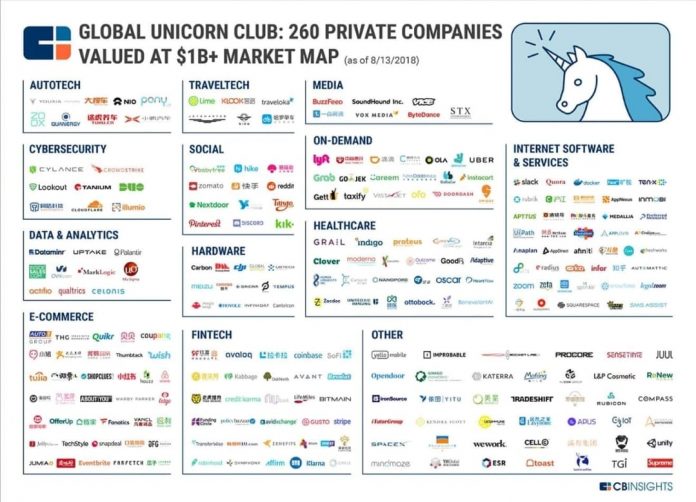CB Insights recently published the Global Unicorn Club which lists private companies from around the world which have a total cumulative market valuation of $850 billion, and a market capitalisation of more than $1 billion!
A market intelligence and venture company, CB Insights uses algorithms, machine learning, and big data through software to analyse companies from all markets, and help organisations make better strategic decisions.In their own words, the company says, “We aggregate and analyse massive amounts of data and use machine learning, algorithms and data visualisation to help corporations replace the three Gs (Google searches, gut instinct and guys with MBAs) so they can answer massive strategic questions using probability not punditry.”
In terms of finance, a unicorn is a privately held startup with a market valuation of $1 billion or more.
In this list of startups and companies which started out as brilliant ideas and have now found their niche and generated millions in revenue, we can see common names such as Uber, Airbnb, SpaceX, Flipkart, Pinterest, Quora, GitHub, Udacity, SurveyMonkey, and Careem.
Former companies in this list, also known as ‘Unicorns’ are now some of the most known companies in the world including Facebook, Alibaba, Xiaomi, Snap Inc, Twitter, Skype and LinkedIn.
Is it about the tech or more about solving basic problems?
Successive developments in disruptive technologies have shown the promise of providing easy solutions to people’s day to day problems. Companies such as Uber and Careem, both included in the list with market capitalisations at $62.5 billion and $1 billion, have changed the way people travel and commute.
Airbnb, which has a market capitalization of $30 billion in the list, helps people find accommodation by allowing users to provide accommodation to others in their own rooms, lodges, and houses.
Such companies have successfully built platforms around which people use their own resources to solve their problems while the companies maintain their technology-based platforms and generate revenue through cuts and commissions.
Even Alibaba, the brainchild of entrepreneur Jack Ma, provides a technology-based platform for buyers and sellers to trade with convenience.
For any new technology-based startup, it is instrumental to realise how important it is to come up with a product or service that serves people, and provides a convenient solution to everyday problems. An effective tech-platform should be next in the list of priorities for example, an easy to use mobile application that connects users with their potential clients, provides all necessary information, and is secure to handle confidential information such as addresses and bank account details.
Commenting on the global startup tsunami that has taken over our everyday lives, a regional product manager working at a startup in Malaysia aiming to make it into the unicorns list said, “Every startup aims to make it big, but most of them do not realise how important it is to create a product that provides the human touch or connection. In this technologically fueled world where we spend most our days looking at screens at work and at home, it has become important for startups to ensure that users feel that they are being taken care of another person, and not AI, or a bot”.
The technological prowess of China is undeniable as the list is dominated by startups originating from China. India, being an IT powerhouse is also heavily represented.




